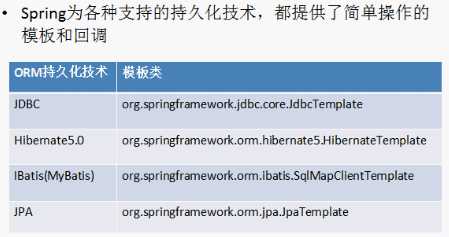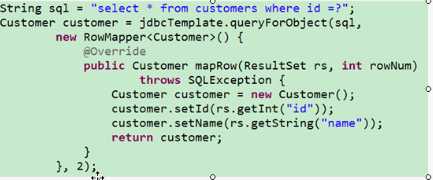标签:work upd change pre url enc init out while
Spring的jdbcTemplate操作
1、Spring框架一站式框架
(1)针对javaee三层,每一层都有解决技术
(2)到dao 层,使用 jdbcTemplate
2、Spring对不同的持久化都进行了封装

(1)jdbcTemplate 对 jdbc 进行封装
3、jdbcTemplate 使用和 dbutils 使用很相似,都是对数据库进行 crud 操作
4、使用jdbcTemplate 实现增删改查操作
增加:
1、导入 jdbcTemplate 相关jar 包

一定要导入相关数据库驱动的 jar 包
2、创建对象,设置数据库信息
3、创建jdbcTemplate 对象,设置数据源
4、调用 jdbcTemplate 对象里面的方法实现操作
//1、增加操作 @Test public void add(){ //创建对象,设置数据库信息 DriverManagerDataSource dataSource=new DriverManagerDataSource(); dataSource.setDriverClassName("com.mysql.jdbc.Driver"); dataSource.setUrl("jdbc:mysql://localhost:3306/url_data"); dataSource.setUsername("root"); dataSource.setPassword("123"); //创建jdbcTemplate 对象,设置数据源 JdbcTemplate jdbcTemplate=new JdbcTemplate(dataSource); //调用 jdbcTemplate 对象里面的方法实现操作 //c创建sql语句 String sql="insert into user values(?,?)"; int row=jdbcTemplate.update(sql, "zhansan","man"); System.out.println("JdbcTemplateDemo1.add()"+row); }
修改:
// 2、修改操作 @Test public void update() { // 创建对象,设置数据库信息 DriverManagerDataSource dataSource = new DriverManagerDataSource(); dataSource.setDriverClassName("com.mysql.jdbc.Driver"); dataSource.setUrl("jdbc:mysql://localhost:3306/url_data"); dataSource.setUsername("root"); dataSource.setPassword("123"); // 创建jdbcTemplate 对象,设置数据源 JdbcTemplate jdbcTemplate = new JdbcTemplate(dataSource); // 调用 jdbcTemplate 对象里面的方法实现操作 // c创建sql语句 String sql = "update user set sex=? where name=?"; int row = jdbcTemplate.update(sql, "woman","zhangsan"); System.out.println("JdbcTemplateDemo1.add()=" + row); }
删除:
// 3、删除操作 @Test public void delete() { DriverManagerDataSource dataSource = new DriverManagerDataSource(); dataSource.setDriverClassName("com.mysql.jdbc.Driver"); dataSource.setUrl("jdbc:mysql://localhost:3306/url_data"); dataSource.setUsername("root"); dataSource.setPassword("123"); // 创建jdbcTemplate 对象,设置数据源 JdbcTemplate jdbcTemplate = new JdbcTemplate(dataSource); // 调用 jdbcTemplate 对象里面的方法实现操作 // c创建sql语句 String sql = "delete from user where name=?"; int row = jdbcTemplate.update(sql, "zhangsan"); System.out.println("JdbcTemplateDemo1.add()=" + row); }
查看:
jdbcutil 用于 jdbcTemplate 的区别 /* * (1)jdbcutils * QueryRunner runner = new QueryRunner(datasource); * * 返回对象 * runner.query(sql, new BeanHandler<User>(User.class)); * * 返回list * runner.query(sql, new BeanListHandler<User>(User.class)); * * (2)jdbcTemplate实现查询,有接口RowMapper * jdbcTemplate针对这个接口没有实现具体的类,得到不同类型的数据需要自己心境数据的封装 */
(1)查询返回某一个值
public void count() { DriverManagerDataSource dataSource = new DriverManagerDataSource(); dataSource.setDriverClassName("com.mysql.jdbc.Driver"); dataSource.setUrl("jdbc:mysql://localhost:3306/url_data"); dataSource.setUsername("root"); dataSource.setPassword("123"); // 创建jdbcTemplate 对象,设置数据源 JdbcTemplate jdbcTemplate = new JdbcTemplate(dataSource); String sql="select count(*) from user"; //第一个参数是sql 语句 //迭戈参数 返回类型的class int count=jdbcTemplate.queryForObject(sql, Integer.class); System.out.println(count); }
(2)查询返回某一个对象
原始方式:
//原始方式 public void testJdbc() throws SQLException { Connection conn=null; PreparedStatement pstmt=null; ResultSet rs=null; //加载驱动 try { Class.forName("com.mysql.jdbc.Driver"); //创建连接 conn=(Connection) DriverManager.getConnection("jdbc:mysql://localhost/url_data", "root", "123"); String sql="select * from user where username=?"; //预编译 pstmt=(PreparedStatement) conn.prepareStatement(sql); pstmt.setString(1, "lisi"); rs=pstmt.executeQuery(); //遍历结果集 while(rs.next()){ //得到返回的结果值 String name=rs.getString("username"); String sex=rs.getString("sex"); User user=new User(); user.setUsername(name); user.setSex(sex); System.out.println(user); } } catch (ClassNotFoundException e) { e.printStackTrace(); } catch (SQLException e) { e.printStackTrace(); }finally{ rs.close(); pstmt.close(); conn.close(); } }
jdbc 方式:
@Test public void FindObject() { DriverManagerDataSource dataSource = new DriverManagerDataSource(); dataSource.setDriverClassName("com.mysql.jdbc.Driver"); dataSource.setUrl("jdbc:mysql://localhost:3306/url_data"); dataSource.setUsername("root"); dataSource.setPassword("123"); // 创建jdbcTemplate 对象,设置数据源 JdbcTemplate jdbcTemplate = new JdbcTemplate(dataSource); String sql="select * from user where name=?"; //调用jdbcTemplate //第一个参数:sql语句 //第二个人参数:类似于 dbutils 中的接口RowMapper,需要自己写实现类,实现具体方法,实现数据封装 //第三个参数: 可变参数(sql中传的值) User user = jdbcTemplate.queryForObject(sql, new MyRowMapper(),"lisi"); System.out.println(user.getName()); }
写一个非public class
class MyRowMapper implements RowMapper<User>{ //num:行号 public User mapRow(ResultSet rs, int index) throws SQLException { //1、从结果集里面把数据得到 String name=rs.getString("name"); String sex=rs.getString("sex"); //2、把没我们得到的数据封装到对象里面 User user=new User(); user.setName(name); user.setSex(sex); return user; } }
匿名内部类

(3)查询返回 list 集合
public void FindList(){ DriverManagerDataSource dataSource = new DriverManagerDataSource(); dataSource.setDriverClassName("com.mysql.jdbc.Driver"); dataSource.setUrl("jdbc:mysql://localhost:3306/url_data"); dataSource.setUsername("root"); dataSource.setPassword("123"); // 创建jdbcTemplate 对象,设置数据源 JdbcTemplate jdbcTemplate = new JdbcTemplate(dataSource); String sql="select * from user"; //调用jdbcTemplate //第一个参数:sql 语句 //第二个参数RowMapper 接口 //第三个参数:可变参数,可以省略 List<User> list=jdbcTemplate.query(sql, new MyRowMapperList()); for(int i=0;i<list.size();i++){ System.out.println(list.get(i)); } }
实现RowMapper类
class MyRowMapperList implements RowMapper<User>{ //index:行号 public User mapRow(ResultSet rs, int index) throws SQLException { //1、从结果集里面把数据得到 String name=rs.getString("name"); String sex=rs.getString("sex"); //2、把没我们得到的数据封装到对象里面 User user=new User(); user.setName(name); user.setSex(sex); return user; }
5、Spring 配置 c3p0 连接池 和dao 使用jdbcTemplate
(1)Spring 配置 c3p0 连接池
- 导入 jar 包

原始的 c3p0 写法
ComboPooledDataSource datasource=new ComboPooledDataSource(); datasource.setDriverClass("com.mysql.jdbc.Driver"); datasource.setJdbcUrl("jdbc:mysql://localhost:3306/url_data"); datasource.setUser("root"); datasource.setPassword("123");
在xml中配置 c3p0
<!-- 配置 c3p0 --> <bean id="dataSource" class="com.mchange.v2.c3p0.ComboPooledDataSource"> <!-- 注入属性值 --> <property name="driverClass" value="com.mysql.jdbc.Driver"></property> <property name="jdbcUrl" value="jdbc:mysql://localhost:3306/url_data"></property> <property name="user" value="root"></property> <property name="password" value="123"></property> </bean>
(2)dao 使用jdbcTemplate
1、创建 service 和 dao 对象,配置 service 和 dao 对象
2、创建 JdbcTemplate 对象,把 模板对象注入到 dao 里面
3、在 jdbcTemplate 对象里面注入 dataSource 对象
Service类
package cn.itcast.c3p0; public class UserService { private UserDao userDao; public void setUserDao(UserDao userDao) { this.userDao = userDao; } public void add(){ System.out.println("service add....."); userDao.add(); } }
dao类
package cn.itcast.c3p0; import org.springframework.jdbc.core.JdbcTemplate; public class UserDao { //要得到jdbcTemplate 对象 private JdbcTemplate jdbcTemplate;
public void setJdbcTemplate(JdbcTemplate jdbcTemplate) {
this.jdbcTemplate = jdbcTemplate;
}
public void add(){ String sql="insert into user values(?,?)"; jdbcTemplate.update(sql,"大力","man"); } }
c3p0.xml 配置:
<?xml version="1.0" encoding="UTF-8"?> <beans xmlns="http://www.springframework.org/schema/beans" xmlns:xsi="http://www.w3.org/2001/XMLSchema-instance" xmlns:content="http://www.springframework.org/schema/context" xmlns:aop="http://www.springframework.org/schema/aop" xmlns:tx="http://www.springframework.org/schema/tx" xsi:schemaLocation=" http://www.springframework.org/schema/beans http://www.springframework.org/schema/beans/spring-beans.xsd http://www.springframework.org/schema/tx http://www.springframework.org/schema/tx/spring-tx.xsd http://www.springframework.org/schema/aop http://www.springframework.org/schema/aop/spring-aop.xsd http://www.springframework.org/schema/tx http://www.springframework.org/schema/tx/spring-tx.xsd"> <!-- bean definitions here --> <!-- 配置 c3p0 --> <bean id="dataSource" class="com.mchange.v2.c3p0.ComboPooledDataSource"> <!-- 注入属性值 --> <property name="driverClass" value="com.mysql.jdbc.Driver"></property> <property name="jdbcUrl" value="jdbc:mysql://localhost:3306/url_data"></property> <property name="user" value="root"></property> <property name="password" value="123"></property> </bean> <!-- 创建service 和 Dao。在Service 中调用dao --> <bean id="userService" class="cn.itcast.c3p0.UserService"> <!-- 注入Dao --> <property name="userDao" ref="userDao"></property> </bean> <bean id="userDao" class="cn.itcast.c3p0.UserDao"> <!-- 注入jdbctemplate对象 --> <property name="jdbcTemplate" ref="jdbcTemplate"></property> </bean> <!-- 创建JdbcTemplate对象 --> <bean id="jdbcTemplate" class="org.springframework.jdbc.core.JdbcTemplate"> <!-- 把dataSource 传到 jdbcTemplate里面--> <property name="dataSource" ref="dataSource"></property> </bean> </beans>
测试:
public void testC(){ ApplicationContext context=new ClassPathXmlApplicationContext("c3p0.xml"); UserService userService=(UserService) context.getBean("userService"); userService.add(); }
测试结果:
在数据库 user 表里添加一条数据
spring学习(四)spring的jdbcTemplate(增删改查封装)
标签:work upd change pre url enc init out while
原文地址:http://www.cnblogs.com/wangleBlogs/p/7446050.html